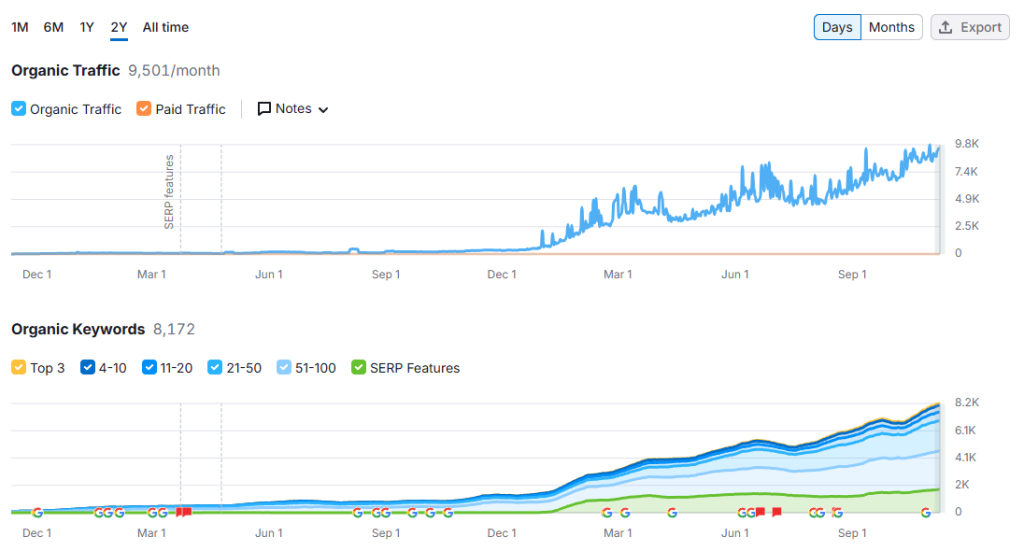With more podcasts on air daily, you are up against a formidable machine. To break through, you must use every card on the deck. On our blog, we already covered how to start your podcast and how to create viral reels. Today, we look at another vital but often overlooked trick: backlink building.
What is Link Building?
Link building is acquiring hyperlinks from other websites to your own, enhancing your site’s authority and visibility in search engines. These links serve as votes of confidence, signaling to search engines like Google that your content is valuable and relevant. The more links connect to your website, the higher you rank.
Effective link-building involves strategies such as guest blogging, creating shareable content, engaging with online communities, and collaborating with influencers. High-quality backlinks from reputable sites can significantly improve your search engine ranking, drive organic traffic, and increase brand awareness. However, link building should focus on quality over quantity, as low-quality or spammy links can harm your site’s credibility and SEO performance.
Why Link Building Can Help Your Podcast
If your podcast is tied to a business, organization, or think tank, it can be a powerhouse for building valuable backlinks that elevate your website’s domain authority (DA). With every podcast episode you release on platforms like Spotify or YouTube, include a link to your website in the description. This simple action brings two key benefits: increased organic traffic and improved DA.
But that’s only the beginning. Podcasts naturally lend themselves to link-building opportunities:
- Episode mentions and collaborations: Guests and collaborators often share episodes on their own websites, creating backlinks to your site.
- Cross-platform promotion: Share episodes on your blog, and embed them into articles that other sites may link to as a resource.
- Networking and outreach: Engaging with niche communities or expert guests creates opportunities for mutually beneficial link exchanges.
By leveraging your podcast effectively, you can generate a robust and diverse link-building strategy. In this article, we’ll explore how to use your podcast to seamlessly build thousands of quality backlinks and maximize your SEO potential.
Step 1: Create a blog post for each episode
One underutilized tool is podcasting. As podcasts gain more popularity, they are also becoming a powerful means for SEO link building. At Uber Flix Studio, we recognize that while creating great podcast content is crucial, it’s equally important to optimize that content to boost your site’s visibility and authority. Let’s dive into how you can use your podcast for SEO link-building strategies in three key ways.
The idea is to leverage your podcast to boost traffic to your website and bring traffic to your podcasts through your website. To begin with, start building a website with a clear architecture to give search engines and easy shot at crawling. This strategy is especially useful if you own a business and if your website sells products and services.
Now that you have a website and a podcast, make sure to create a blog post for each podcast. Don’t have the time to type out the stuff? Use AI tools such as Descript, Otter.AI and Copy.AI to automatically create a blog post for you.
Every time you publish an episode, publish a blog post with the link to your episode on your website. This is going to boost your SEO content on your website as infographics often positively add to the experience of the reader. The rationale behind it is this is giving viewers more choice in how they want to consume your information.
Each time you post a video podcast and link back to your website, you generate a valuable backlink. According to WordStream, websites that incorporate video content experience 157% more organic traffic compared to those without. This means that every video podcast you share is not only boosting engagement but also improving your chances of earning high-quality backlinks from other websites that embed or reference your content.
Additionally, sharing these videos across social platforms and embedding them on your website helps increase user engagement and on-site time, another key SEO factor. Transcripts and captions are also crucial here, as they provide additional text that search engines can crawl, further increasing your site’s SEO potential.
Step 2: Insert Links to Your Website on All Your Podast Hosting Platforms
Let’s say you’re using Spotify (formerly Anchor.fm) as the anchor for your podcast. A smart move is to copy and paste a portion of your blog description into the episode’s details and include a link back to your website’s podcast episode. This strategy creates a network of valid references that interconnect all your content. And here’s the kicker: Google’s ever-evolving algorithm loves reliable, relevant linking.
While Spotify’s links are typically no-follow (which don’t directly pass SEO authority), they still drive valuable traffic and bolster your content’s visibility. Pro tip: no-follow links help build awareness, while do-follow links deliver that coveted SEO boost.
Platforms like Spotify boast incredibly high domain authority, meaning that a link from these sites carries significant SEO weight. According to Ahrefs, a staggering 91% of web pages see no organic traffic. By leveraging backlinks from high-authority platforms like Spotify, you can ensure your site avoids that fate.
But don’t stop there. Wherever you share your RSS feed, make sure the video description includes a link to your website. Better yet, any platform that lets you create an account for your RSS feed is another chance to insert a link to your landing page, solidifying your online identity.
This approach also simplifies content sharing for others. BrightEdge reports that 68% of all online experiences start with a search engine, so your podcast episodes must be optimized for searchability. With well-crafted descriptions, your podcast is more likely to be linked by other sites, further boosting your SEO game.
Step 3: Sharing is caring!
Now that you have created the infrastructure, use these websites to spread the message above and beyond for free!

This dashboard highlights the organic growth of a partner website dedicated to Canadian Craft Beer, spanning from December 1, 2023, to November 2024. Just over a year ago, this modest blog began dominating top search positions on Google after sharing a handful of well-crafted articles on Facebook and Reddit—leveraging the strategies outlined later in this article. Since then, the website has consistently gained an impressive average of 50 new backlinks per day.
1. Reddit
I know what you’re thinking: Reddit is an awesome platform for sharing topical, relevant content. But let’s be real—it can also be a nightmare. If you’re new to the platform, beware of self-promotion. Reddit communities hate it, and they are quick to denounce it. But don’t worry; there’s a workaround. The key is to find a relevant subreddit—a community that functions a bit like a Facebook group—and contribute content that resonates with its members. Keep an eye on those upvotes and downvotes.
Sure, it’s a steep learning curve. But if you’re patient, the payoff can be astronomical. One of our clients penned a dozen long-form articles about booze in ancient times and racked up nearly 10,000 backlinks from just a few Reddit reposts. He recently told us he’s now seeing around 50 new backlinks a day from that effort.
Here’s the kicker: Reddit posts are treated like standalone web pages by Google. Plus, numerous sites operate their own VPNs on Reddit, crawling through content and creating their own pages with your embedded links. With a few stellar posts, you can enjoy the benefits of link building for the long haul.
That said, it’s not all sunshine and rainbows. First, post your own content without reading the group’s rules, and you could get banned in an instant. Second, many sites that scrape Reddit for content are little more than empty shells, and some can be downright shady. If you’re serious about your SEO reputation, too many backlinks from these kinds of sites can signal to search engines that your content is junk.
2. Facebook Groups and Pages
So why isn’t Facebook topping our list of free tools? Unlike Reddit, it doesn’t provide any SEO juice. What it does offer is a massive audience and easy access to thousands of relevant discussion groups. While posting on Facebook won’t give you valid backlinks, it can boost your organic traffic, which is still crucial. Plus, if someone really connects with your article, they might reference it on their own site—assuming, of course, that your content is up to snuff.
3. Flipboard
Never heard of Flipboard? No worries. It’s a customizable news hub that delivers tailored content right to your computer or phone. Sure, you could get an AI to do this for you, and there are plenty of other sites out there that offer similar services. But here’s the catch: platforms like Flipboard thrive on other people’s content. Even if your articles don’t get read on the app, snagging a few links from them is still a win. Flipboard boasts an impressive domain authority of 44 according to SEO analysis site Semrush, attracting over 70,000 organic visitors each month and nearly 220,000 referring domains. You’ve got nothing to lose!
4. Tumblr
Think Tumblr is just a haven for memes and fandoms? Think again. This platform has evolved into a vibrant microblogging site where users can share everything from art to articles. With its visually-driven interface, Tumblr allows you to showcase your content in creative ways, making it more engaging for potential readers. While Tumblr may not pack the same SEO punch as Reddit, it can still drive significant traffic to your site. Plus, the community is often highly interactive, encouraging reblogs and shares, which can amplify your reach.
What’s more, Tumblr has a solid domain authority of 89, which means backlinks from your posts can still carry weight in search rankings. If you craft compelling content and connect with niche communities, you could find yourself gaining visibility and new followers in no time. So, don’t overlook Tumblr—it might just be the under-the-radar gem you need to boost your online presence.
5. Medium
Medium is a powerful platform that allows you to publish articles and essays, making it a great place to repurpose your podcast content. By transforming your podcast episodes into written articles on Medium, you can reach a broader audience and include links back to your website. The platform has a high domain authority, so backlinks from your posts can significantly enhance your SEO. Plus, Medium’s built-in audience means your content has a good chance of being discovered by new listeners who might not have found you otherwise. Just be sure to engage with the community and share your insights, as active participation can lead to more shares and even higher visibility.
6. LinkedIn
LinkedIn is often overlooked as a content-sharing platform, but it’s a goldmine for professionals looking to boost their SEO. By sharing blog posts or summaries of your podcast episodes on LinkedIn, you can tap into a network of industry professionals and potential listeners. Include links back to your website or specific podcast episodes to drive traffic and create valuable backlinks. With its high domain authority, LinkedIn can help increase the visibility of your content. Additionally, engaging with relevant groups and discussions can further expand your reach, allowing you to connect with like-minded individuals who may share your content within their networks.
.
Never Hire an SEO expert!
Incorporating podcasting into your SEO link-building strategy is a forward-thinking way to increase your digital presence. By optimizing your RSS feed with rich content descriptions, adding video to enhance content rankings, and distributing your podcast across multiple platforms for valuable backlinks, you can drive more traffic and authority to your site.
At Uber Flix Studio, we believe that every content creator should leverage the full potential of their podcast not only for audience engagement but also for SEO success. Let your voice be heard—by your audience and by search engines alike!

Pierre Bussières is Editor of Uber Optimized, Director of Sales with JeemanGo Podcasts, and Editor in Chief of Hoppy History. He writes on alcohol markets, beer history, and disruptive technologies. He previously wrote for Global Risk Insights, the Diplomat, Reflets, La Montagne des Dieux, the NATO Association of Canada, Diplomatie, and Le Temps d’une Bière.


